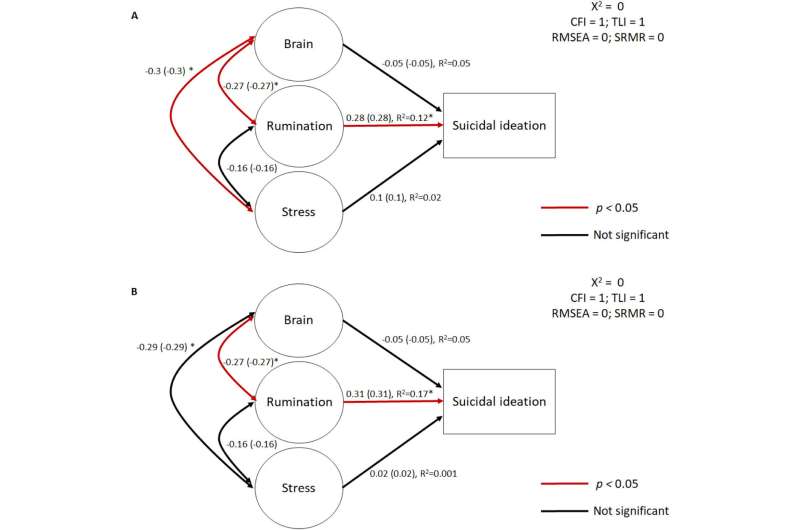This article has been reviewed according to Science X's editorial process and policies. Editors have highlighted the following attributes while ensuring the content's credibility:
fact-checked
peer-reviewed publication
trusted source
proofread
Repetitive negative thinking during low mood linked to suicidal thoughts

A tendency towards repetitive, fixed thinking during low mood has been related to suicidal thoughts among adolescents with major depressive disorder in a new study.
Suicide is the second most common cause of death among young people, with around 800,000 deaths worldwide. Major depressive disorder carries on of the highest risks of suicide, and so better understanding the mechanisms which underlie this risk is critically important.
Researchers at the University of Birmingham in collaboration with researchers from the University of Cambridge, Leiden University, University of Melbourne and Yale Medical School examined three different risk factors thought to be linked to suicidal ideation (suicidal thoughts) among young people with major depressive disorder.
In the study, published this week in the Journal of Affective Disorders, the team looked at repetitive negative thinking—or cognitive rumination—structural changes in specific regions of the brain; and recent stress.
They used data from an existing clinical trial (MR-IMPACT), set up to investigate major depressive disorders among adolescents. The aim was to test theories that suicidal ideation is linked to functional changes in specific regions of the brain, which are also linked to repetitive negative thinking, or cognitive rumination.
In addition, recent stressful experiences during childhood are thought to shape brain development and have been linked to structural brain alterations thought to be associated with suicidal ideation.
The links between cognitive rumination, and its underpinning brain structure have not previously been studied in relation to suicidal thoughts and behaviors in young people with major depressive disorders.
The findings, which are preliminary, include data from 67 male and female participants with an average age of 16. All the participants had a diagnosis of major depressive disorder. The results suggest that increased rumination is a predictor of greater severity of suicidal ideation in young people with major depressive disorder.
The team did not find any significant links between recent stresses and suicidal thoughts, or between lower surface area in the brain regions studied and suicidal thoughts—although recent studies have linked brain surface area, rumination and recent stress.
Lead researcher, Dr. Maria Dauvermann, of the School of Psychology at the University of Birmingham said, "We found evidence that increased levels of rumination predicted increased levels of suicidal thoughts. This was the most significant finding in the study and—although only a preliminary finding—it provides a promising benchmark from which to investigate this area further and could lead to new treatment methods for young people with major depressive disorders."
More information: Maria R. Dauvermann et al, Elevated cognitive rumination and adverse life events are associated with lower cortical surface area and suicidal ideation in adolescents with major depressive disorder, Journal of Affective Disorders (2022). DOI: 10.1016/j.jad.2022.12.087



















